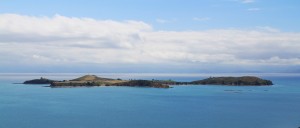A private island in New Zealand’s Hauraki Gulf has been transformed into a unique wildlife experiment, complete with walking trails, heritage buildings and even holiday homes.
- Rotoroa Island was once a facility to recovering alcoholics and addicts, but has since undergone an incredible transformation into a bold, new wildlife experiment
- With the help of Auckland Zoo, a team of conservationists known as the Rotoroa Island Trust have established an arts, heritage and conservation estate which is accessible to all
- The program, headed by zoologist Jonathan Wilcken, has already enjoyed its first successes, introducing 4 rare new species to the island in less than 12 months
At just 82 hectares in size, Rotaroa Island is certainly small in statute. Yet despite its size, the tiny Hauraki Gulf island is making a big impact on the country’s conservation efforts, forming one of the boldest wildlife experiments in New Zealand’s recent history and making a point that humans aren’t simply capable of destroying nature, they’re capable of creating it, too.
A Tiny Island with a Big Heart for Conservation
Over the course of the last few years, the island, which was once off-limits to all but a few recovering alcoholics and addicts, has been transformed the site of an incredible eco-experiment which encompasses an award-winning arts, heritage and conservation estate and a world-leading wildlife sanctuary.
With the help of Auckland Zoo, the island’s private management company, The Rotaroa Island Trust (lead by local philanthropists Neal and Annette Plowman), has set itself the bold target of introducing a total of 20 new species over the next decade – no mean feat for a program still in its early phase.
And indeed, the groundbreaking evolutionary experiment already looks set to succeed, having introducing 4 rare new species in the first year (including one of New Zealand’s most famous and endangered avian species –the kiwi). A fifth species – the takahē – is soon to follow.
An Unconventional Approach
Despite its obvious success, the project has already ruffled feathers thanks to its unconventional approach. Going against the grain of traditional, (re-)population efforts, the Rotaroa Team has decided not to concentrate simply on flora and fauna native to the region, preferring instead to create a sort of “active zoo” aimed primarily at preventing the extinction of charismatic animals
“We are deliberately aiming not to recreate an ecosystem, but to create an ecosystem anew,” explained Jonathan Wilcken, Director of Auckland Zoo “We don’t frankly care very much whether those species existed on Rotoroa Island, nor do we care very much if the species could sustain themselves if we weren’t there to manage them.”
Could the success of Rotaroa’s “active zoo” concept cause a rethink regarding attitudes to wildlife conservation? Onnie Byers of the Conservation Breeding Specialist Group certainly thinks so. “There has been a shift in conservation thinking and conservation philosophy in general,” she explained.
“Traditionally, we have aimed for extreme [field] conservation, where species don’t need any management,” continued Byers. In the face of population growth, biodiversity upheaval and continuing climate change, however, she believes that its time to consider new approaches. “We are in crisis and all approaches must be explored and promising ones developed. That’s what’s happening on Rotoroa. We’re certain that one day [our work] will serve as a model for others.”
Rotoroa Island is also home to a series of first class holiday homes. Offering fantastic views, comfort and a close-proximity to the island’s cutting edge conservation estate, the island’s cosy holiday homes and the 18-people hostel are all available to rent. Contact travel@vladi.de for more details.
Read more:
- Ngati Toa Celebrate Return of Two Ancestral Lands (September 2012)
http://www.privateislandnews.com/new-zealand-ngati-toa-celebrate-return-of-two-ancestral-islands/
- Vast Puangiangi Island Bought for Nature Reserve (June 2012)
http://www.privateislandnews.com/new-zealand-vast-puangiangi-island-bought-for-nature-reserve/ - Life Amongst the Dinosaur’s on New Zealand’s Stephens Island (June 2012)
http://www.privateislandnews.com/new-zealand-life-among-the-dinosaurs-on-stephens-island/



